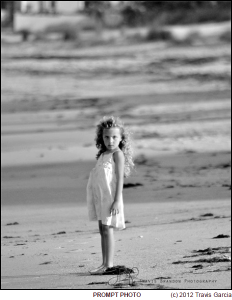Grant crept down the hallway with his right hand against the rough, stone wall. It was impossible to see in the darkness.
“Why do the lights have to be off?” He whispered.
“Because,” The guide’s voice whispered back. “They don’t like the light.”
She still wouldn’t tell him what they were. “Navigating by hand is kind of difficult. Can’t we…”
Suddenly his hand was at his side, enveloped in hers. He could feel her breath on his cheek as her voice lowered to a barely audible level. “Don’t touch the walls. Use me.”
Then his hand was resting lightly on her hip. The blood rushed to his cheeks and he was almost grateful that she couldn’t see him. He slid his hand up and gripped her side as she began moving forward again.
For months he listened to stories of the caves. Stories of death and lost souls. Stories of horrible monsters. Not once did he ever get a description of the creatures, or how they killed. What was in here?
A faint violet light glowed just beyond his line of vision. Slowly, his head turned. Gone. Then another one to the right. This time it was closer. He could almost touch it.
“Focus on me.” His guide slid his hand back down to her hip. “Nothing else matters.”
What was she trying to hide from him? What could possibly be so bad that he couldn’t even know about it? Another light; two; three. It didn’t take long to see that they were crystals. Large, heavy looking crystals set in the walls. Was that it? Did the crystals have some sort of magic?
Then he was in her arms. Her embrace was stronger than he expected. Her forehead was resting on his. “Please, don’t look at them.”
How could she possibly know what he was doing in this blanket of black? He tried to push free of her, but to no avail.
“It’s my gift. I can feel you… Feel them.” A delicate hand slid up and cupped his face. “They’ve noticed you looking. It won’t end well.”
“I don’t…” Then he saw them. Humans; or at least they appeared to be in the dim, purple glow. They wore nothing, their forms bare for all to see. But it wasn’t their nakedness that held his attention. Nor was it the pulsing crystals where their hearts should be. It was their eyes.
Brilliant, lavender eyes. Empty, soulless eyes. They seemed to stare straight into him, to dig around in the darkest places of his being and lay bare all of his fears and failures. A shiver ran down his spine and he felt his partner tremble in response.
“I begged you.” He could hear the desperation in her voice. “I warned you.”
Her mouth was at his neck. Slow delicate sucking pulled his focus back to her. Her embrace had tightened impossibly and her teeth grazed his flesh.
A short reprieve. “They’re going to eat us. It’s too much.”
He heard the bite more than he felt it. A wet, tearing sound mingling with his own yelp of surprise. He didn’t feel any pain. Just a warm trickle down his neck.
She tugged at his neck with her teeth and the pain kicked in as she ripped into him. He fought the dizziness and the lust. He pushed them back as he focused on the memories of the spell. He only had one chance to save them.
His knees gave way as more of his flesh was pulled from his body. Laying helpless on the floor, the woman laying atop him, he felt the mass of bodies close to him. He could smell the wet earth inches from his face as a second set of teeth sunk into his left thigh.
White tunnel. Focus. The spell coalesced in his mind as he lost feeling in his right arm. He felt the familiar tug at his insides as the energy surrounded him.
Silence. The creatures were gone and she was no longer trying to tear him apart. It worked. His voice hoarse and low, he mumbled out an apology.
“Shh…” she was sitting on him now. “Don’t try to talk. You’re too injured for that. Think. Your thoughts are mine, remember.”

